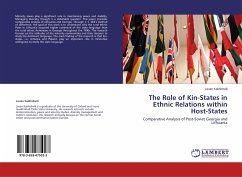Minority issues play a significant role in maintaining peace and stability. Managing diversity, though, is a debatable question. This paper provides comparative analysis of Lithuania and Georgia. Through J. S. Mill's method of difference, the goal of this work is to understand why the rural ethnic Poles in Lithuania acquired higher command of the state language than the rural ethnic Armenians in Georgia throughout the 1990s. The research focuses on the attitudes of the minority communities and their decision to study the dominant language. The main finding of the research is that kin-states, i.e. Armenia and Poland, play an important role in minorities' willingness to study the state language.
Bitte wählen Sie Ihr Anliegen aus.
Rechnungen
Retourenschein anfordern
Bestellstatus
Storno








